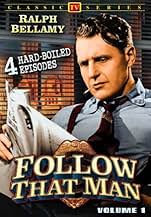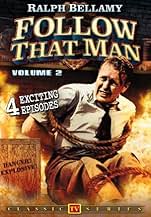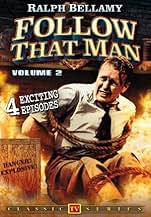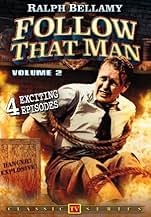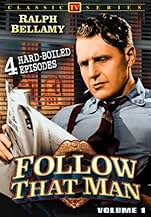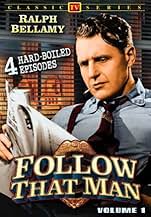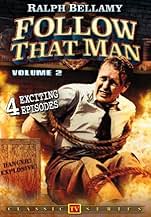Ajouter une intrigue dans votre langueMike Barnett is the title character, a bright and tough private detective in New York. This very violent show was broadcast live until 1952.Mike Barnett is the title character, a bright and tough private detective in New York. This very violent show was broadcast live until 1952.Mike Barnett is the title character, a bright and tough private detective in New York. This very violent show was broadcast live until 1952.
Parcourir les épisodes
Avis à la une
"Man Against Crime" is one of the earliest detective series, premiering in 1949 on CBS, switched to film in its fourth season, and leaving in 1954. Ralph Bellamy, a distinguished actor known for movies like "His Girl Friday", played the man against crime, Mike Barnett, a New York PI who solves crimes with his mind, and occasionally his right hook. He doesn't even carry a gun. Imagine that... a private investigator without a gun. And in New York City, no less. Plus, he's chummy with the local police. Somewhere in Brooklyn, Mike Hammer wishes he had that kind of luck solving the kind of cases Barnett has.
The scripts and production values do justice to its star; with an actor like Ralph Bellamy and a character like Mike Barnett, they have to. Barnett is world-weary, but not jaded; he has a sense of humor, and he maintains a sense of dignity even while busting some heads. It takes a likable actor to fill the role of a likable man, and Bellamy fits that role like a comfortable pair of loafers. Then again, any man who can hold his own while dealing with Eddie Murphy and the rap group The Fat Boys in his later years is tops in my book.
Two years after Bellamy caught his last scumbag, Mike Barnett was dusted off for a brief live summer run on NBC. Frank Lovejoy took over the role, and while he was competent, the scripts weren't. Plus, this Mike Barnett packed heat, giving credence to the old adage that it may look like a duck, and quack like a duck... Try to catch Lovejoy in the series "Meet McGraw" instead, and skip this rehash.
"Man Against Crime" is a Pathescope Production in association with, and sponsored by R.J. Reynolds Tobacco Company. 82 episodes were made and syndicated under the title "Follow That Man".
The scripts and production values do justice to its star; with an actor like Ralph Bellamy and a character like Mike Barnett, they have to. Barnett is world-weary, but not jaded; he has a sense of humor, and he maintains a sense of dignity even while busting some heads. It takes a likable actor to fill the role of a likable man, and Bellamy fits that role like a comfortable pair of loafers. Then again, any man who can hold his own while dealing with Eddie Murphy and the rap group The Fat Boys in his later years is tops in my book.
Two years after Bellamy caught his last scumbag, Mike Barnett was dusted off for a brief live summer run on NBC. Frank Lovejoy took over the role, and while he was competent, the scripts weren't. Plus, this Mike Barnett packed heat, giving credence to the old adage that it may look like a duck, and quack like a duck... Try to catch Lovejoy in the series "Meet McGraw" instead, and skip this rehash.
"Man Against Crime" is a Pathescope Production in association with, and sponsored by R.J. Reynolds Tobacco Company. 82 episodes were made and syndicated under the title "Follow That Man".
In the early days of television most of the shows were either patterned after hit radio series such as "Gunsmoke" or based on old movies such as "Topper." There were a few originals though such as the great "I Love Lucy" and "Your Show of Shows." Even the originals tended to utilize known radio and film stars when possible. Most of the big stars of Hollywood, however, believed that television would hurt their image. For example, John Wayne was sought to play Matt Dillon on TV's "Gunsmoke." He declined but recommended a friend who was just starting out in cinema James Arness, whose biggest role up to that point had been the unrecognizable "The Thing." Radio's Matt Dillon, stocky William Conrad, just did not fit the visual image of Mr. Dillon.
Ralph Bellamy had been a top Hollywood star in the 1930's playing mainly in romantic comedies, such as "The Awful Truth" and "His Girl Friday." As he grew older, parts began drying up for the versatile actor as times and tastes changed. Bellamy stayed in shape and his rugged handsome features drew the attention of the television producers putting together a tough, somewhat violent series about a crime busting PI named Mike Barnett. The show was to be called "Follow That Man," since surveillance was one of Mike Barnett's main duties. Later the title was changed to "Man Against Crime." The show was shot in New York City, at first live. Mike Barnett made handy use of his fists when need be. He also liked to solve crimes alone, without much help from other law enforcement authorities, although the local police did call Barnett in from time to time to help them solve a case. He never had a partner or confidant. Even the show's opening was violent. A man is shown running at breakneck speed down a deserted New York City street being chased by a man driving a black car. The running man ducks into a building and up the stairs to Mike Barnett's office. But before Barnett can answer the knock, the running man is riddled with bullets from a submachine gun. When Barnett opens the door he too is shot at but missed. He then gives chase to the killer. "Follow That Man" appears in bold letters, the title of the particular episode is shown and the action begins.
When Bellamy left the series, there was a brief attempt to revive the show with Frank Lovejoy playing Mike Barnett. Bellamy was one of the few actors who went from movies to television and then back to movies. He continued acting the rest of his life and had important roles in such box office hits as "Trading Places" and "Pretty Woman." He also did TV appearances until his death in 1991. Today his most remembered role is playing Franklin D. Roosevelt in "Sunrise at Campobello" and "The Winds of War."
Ralph Bellamy had been a top Hollywood star in the 1930's playing mainly in romantic comedies, such as "The Awful Truth" and "His Girl Friday." As he grew older, parts began drying up for the versatile actor as times and tastes changed. Bellamy stayed in shape and his rugged handsome features drew the attention of the television producers putting together a tough, somewhat violent series about a crime busting PI named Mike Barnett. The show was to be called "Follow That Man," since surveillance was one of Mike Barnett's main duties. Later the title was changed to "Man Against Crime." The show was shot in New York City, at first live. Mike Barnett made handy use of his fists when need be. He also liked to solve crimes alone, without much help from other law enforcement authorities, although the local police did call Barnett in from time to time to help them solve a case. He never had a partner or confidant. Even the show's opening was violent. A man is shown running at breakneck speed down a deserted New York City street being chased by a man driving a black car. The running man ducks into a building and up the stairs to Mike Barnett's office. But before Barnett can answer the knock, the running man is riddled with bullets from a submachine gun. When Barnett opens the door he too is shot at but missed. He then gives chase to the killer. "Follow That Man" appears in bold letters, the title of the particular episode is shown and the action begins.
When Bellamy left the series, there was a brief attempt to revive the show with Frank Lovejoy playing Mike Barnett. Bellamy was one of the few actors who went from movies to television and then back to movies. He continued acting the rest of his life and had important roles in such box office hits as "Trading Places" and "Pretty Woman." He also did TV appearances until his death in 1991. Today his most remembered role is playing Franklin D. Roosevelt in "Sunrise at Campobello" and "The Winds of War."
Le saviez-vous
- AnecdotesWhen the show first was broadcast in 1949, Ralph Bellamy was still appearing on Broadway in "Detective Story" and would be rushed by squad car to the theater, which held the curtain on broadcast nights as late as 9:00 to accommodate the actor.
- ConnexionsFeatured in Television: The Story Machine (1985)
Meilleurs choix
Connectez-vous pour évaluer et suivre la liste de favoris afin de recevoir des recommandations personnalisées
Détails
- Durée30 minutes
- Couleur
- Mixage
- Rapport de forme
- 1.33 : 1
Contribuer à cette page
Suggérer une modification ou ajouter du contenu manquant

Lacune principale
By what name was Man Against Crime (1949) officially released in Canada in English?
Répondre
